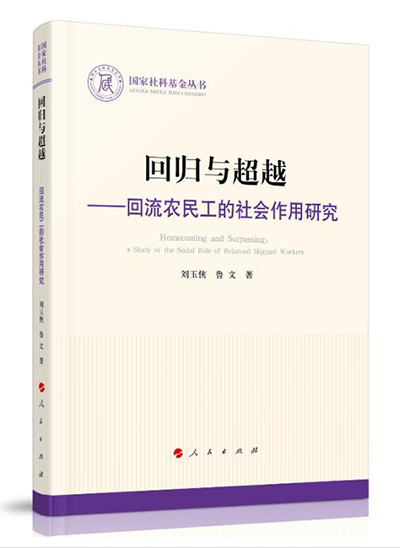Social roles of returned migrant workers

Homecoming and Surpassing: A Study of the Social Role of Returned Migrant Workers
Homecoming and Surpassing: A Study of the Social Role of Returned Migrant Workers, co-authored by Liu Yuxia and Lu Wen, a professor and a lecturer from the School of Marxism at Wenzhou University respectively, conducts an in-depth investigation and analysis on the motives for the return of migrant workers and on the original village economic conditions, cultural traditions, social structure, social relations, and other factors. It enquires into the factors influencing homecoming migrant workers who play a role in rural areas, seeking a theoretical and policy basis for better playing the social role of returned migrant workers.
The book highlights systematic analysis and social interaction. It shows horizontal diachronic considerations on migrant workers, and takes their going out, back flow, homecoming, and local participation as a close-knit continuous practice mechanism, thereby discussing the impact of migrant workers’ going out on their decision of return and the impact of the decision on homecoming and participation. At the same time, the book focuses on the longitudinal synchronic characteristics of returned migrant workers, trying to reveal its profound impact on the group’s homecoming and re-participation, the performance of social roles, identity reconstruction, and individual development.
The authors review the social behavior of returned migrant workers in complex social interactions. Due to the disclosure of complex social interactions between different types of returned migrant workers, between migrant workers returned and in cities, and between returned migrant workers and rural society, the status quo of returned migrant workers’ homecoming, local participation, and identity reconstruction is presented in a panoramic manner.
From the perspective of motivation, the return of migrant workers is affected by multiple levels, dimensions, and factors, including the factor of socio-economic structures (macro), the factor of fulfilling family responsibility and cultural identity (meso), the factor of individual development intentions and life course (micro), etc. These factors are categorized into four types: “personal development needs,” “calling of family responsibility,” “helpless choice for survival,” and “attachment to and expectation for home villages,” among which “personal development needs” and “attachment to and expectation for home villages” are active factors, while “calling of family responsibility” and “helpless choice for survival” are passive factors. The scale of passive return is larger than that of active return, and the typological differences and individual differences of returned migrant workers affect the performance of their social roles.
Wang Chunguang is deputy director and research fellow from the Institute of Sociology at the Chinese Academy of Social Sciences.
Edited by YANG LANLAN

 PRINT
PRINT CLOSE
CLOSE